Scribes Square
Why Some EFL Teachers Stay Relevant (And Others Disappear): Lessons from Hollywood

By Maria Lisak
Have you ever wondered why some TV actors from massively successful shows seem to vanish while others enjoy thriving careers for decades? Think about the cast of Friends: Jennifer Aniston became a Hollywood mainstay, but others struggled to escape the shadow of their iconic roles. This isn’t just a quirk of show business—it’s an example of the "economics of fame," a concept that applies to EFL teaching careers. Just as actors must reinvent themselves to stay in demand, EFL teachers must navigate an industry that rewards adaptability, strategic networking, and...
English in South Korea 2024

By Maria Lisak
This year, four academic papers significantly deepened my understanding of English language education and its role in South Korea.
The first, English as a Foreign Language Education in East-Asian Early Childhood Education Settings: A Scoping Review by Liang, Chik, and Li, provided valuable insights into trends in policy, technology, teacher education, and pedagogy within early childhood education. It also prompted me to reflect on the sociocultural differences in English language teaching (ELT) across East Asia.
Terasawa’s East Asia and English Language...
The KOTESOL Logo and Its Evolution
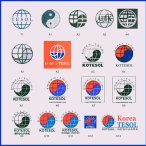
By David Shaffer
How many logos does KOTESOL have? Or maybe we should ask “How many logos has KOTESOL had?” This short article is an attempt to answer these burning questions, and a bit more to boot.
The TESOL Logo
To consummately understand the evolution of the KOTESOL logo, we need to go back to pre-KOTESOL days – to the days of two English language teacher organizations that preceded KOTESOL: TESOL International Association (TESOL) and The Association of English Teachers in Korea (AETK). For many years, until its recent change in logos, TESOL’s logo was a black-and-...
"They" as a Third-Person Singular Pronoun

By David Shaffer
When I was growing up, my English teacher told us that the proper way to express the third-person singular as a generic pronoun was to use he/him/his. Never mind that it was a masculine pronoun; it was the “convention” to keep things neat and succinct. Later, as the women’s liberation movement gained momentum, the need for more gender equality in the English lexicon and grammar became apparent.
One “solution” to the situation was to use feminine pronouns in place of the former masculine ones for the generic third-person singular: she/her/hers. This received...
Differences in Maxims, Politeness Conventions and Directness of Speech between Korean and English

I once heard a polyglot say that learning a language is learning a culture - when they speak Italian, they become Italian, when they speak Korean, they are Korean - and this is the mindset they have that allows them to speak so well in different languages.
While not all of us, or our students, will be motivated to immerse this deeply into a language, it points at the truth of how language and culture cannot be separated - and understanding these differences is essential, as a teacher and a language learner. Being an ESL instructor in Korea, I’d like to offer a brief explanation of...
New and Significant Changes to APA References and Citations
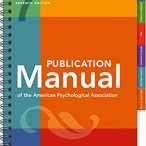
By David Shaffer
After a reign of ten years over the scholarly publications world of the social sciences, including ELT, the American Psychological Association’s Publication Manual (APA, 2010) abdicated to the seventh edition of the Publication Manual (APA 2020). APA (2020) brings with it a number of significant changes over the sixth edition, several of which are changes to frequently used items and which tend to simplify formatting. This article deals with some of the most significant APA changes in formatting for (1) references and (2) in-text citations, two related categories...
How to Balance Work, Study, and Social Life

by Katherine Scott
In today's busy world, more often than not, you find yourself struggling to balance your commitments, whether it be study and work, or your partner and your social life. For instance, last semester, I had to learn how to do online teaching at work. I had to train myself on how to create videos and learn how to use an e-learning platform. As this was time-consuming, I fell behind in my studies (Master of Education, TESOL at University of Southern Queensland) and had to drop university for the semester to concentrate on my work. I was much happier when I did this,...
Teaching in a Time of Crisis and the Opportunities to Inspire Social Activism
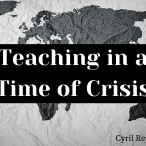
This year began with a pandemic that seemed, at the outset, to be only located in Asia. By March, it became clear that COVID-19 was a pandemic. The world was not ready for it, but as infections spread, people did their best to tell uplifting stories: of people cheering health care professionals after a long shift at the hospitals; of people reading books to children; there are videos of people trying to make the best out of a frightening and difficult situation; and the world economy might even recover according to the president of the United States.
Then there were a series of...
Blog Review: Willy’s ELT Corner

Blog Review: Willy’s ELT Corner
By Jocelyn Wright
-------------
By now, you may be familiar with some of the active blogs listed on Top 100 ESL Teacher Blogs & Websites to Follow in 2020 (ELT blogs) (https://blog.feedspot.com/esl_teacher_blogs/). However, you may not yet have seen a new one that appeared on the Internet in December of 2019: Willy’s ELT Corner (https://willyrenandya.com/). If you have been around English Language Teaching (ELT) for some time, you will correctly guess that this blog was created by Willy A. Renandya, a renowned language teacher...
Sites That Can Help You Teach Online Better

By Matt Ehlers
Member, Korea TESOL (2013-17)
MA TESOL Candidate, SIT Graduate Institute
Here is a directory of websites about online teaching, which I put together over the past few weeks. It includes the following sections:
Regular online teaching: This section includes entries on planning, organizing, and running an online course--when the instructor has enough time to put it together. They include news articles and the like that give basic information on online teaching; suggestions and tips for how to plan and run an online class; guides that go into more...New Year Resolutions on Reflective Practice
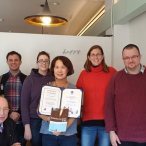
By Dr. Yeon-seong Park
The 7th anniversary of Gwangju-Jeonnam Reflective Practice Group is coming on April 13. Seven years of fellowship of learning! I feel so lucky to be included in this group because we have innovative co-founders (Maria Lisak and Jocelyn Wright) and dedicated co-facilitators! Naturally, I felt both honored and embarrassed when my name was called as the Thomas Farrell Reflective Language Teacher Award 2019 winner. With thanks to Bryan Hale who recommended me. In my mind, I am now thinking what I can do for the future of GJ Reflective Practice SIG for the year...
Is your career heading in the right direction?

A career path is not set in stone. It is natural for people to wonder if they are working in the wrong profession, underutilizing their skills or not living up to their full potential. Millions of office cubicles all over the world are occupied by dreams of new career paths and opportunities.
According to a 2019 survey by the U.S. Department of Labor Statistics, the average person switches jobs 12 times during their careers. Long gone are the days when people, such as my uncle, would spend their entire careers with a single employer (in my uncle’s case, British Rail). Nowadays, it...
KOTESOL Gives Back! Conferences Are a-Changin’
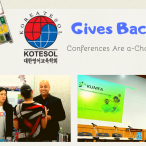
Grab a hold of a paintbrush. Illustrate the first image that comes to mind when you hear the word ‘conference’. If you’re like me, you start drawing a room… perhaps an auditorium. You sketch out a presenter with a microphone. Hundreds of faces come next, listening attentively to the speech (or if you’re a realist painter, looking down at their smart phones). What you don’t paint is KOTESOL Gives Back, the fundraising event that added new color and shaped new meaning for one of the greatest English language teaching conferences in Asia.
A conference is about so much more than sharing...
What Every EFL Teacher Really Wants

What does every EFL teacher really want? That is a good question. A researched question. A question with emotion behind it. What do you as an EFL teacher really want?
Before we provide the answer to this question, why don’t you see if you know the answer? Think about it. What is the one thing that makes you excited in your teaching career?
Is it preparing a lesson? Is it attending a conference...like the 2019 KOTESOL International Conference in Seoul? Is it to stand in front of a class and engage with students? Is it to talk about language learning? Is it to connect with other...The 2019 International Conference Is Finally Here

The 27th annual Korea TESOL International Conference will be here from October 12-13, 2019. This year’s theme is Advancing ELT: Blending Disciplines, Approaches and Technologies. Andrew D. Cohen and Rod Ellis are the plenary speakers for the event. There are two featured panels: Women in leadership in ELT and Women in Leadership in Korea.
The featured speakers for this event are Peter Roger, Curtis Kelly, Bodo Winter, Stephen Ryan, Thomas S.C. Farrell, Boyoung Lee, Kara Mac Donald, Birsen Tutunis, and Heyoung Kim. The event will be held at Sookmyung Women’s University in Seoul. It...
Let’s talk about the 2019 KOTESOL International Conference
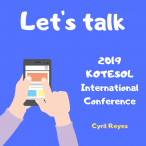
The 2019 KOTESOL International Conference, taking place between October 12-13 at Sookmyung Women’s University in Seoul, will feature a presentation and workshop with Andrew Cohen.
A: My classes have been rather dull. My students are already dozing. They are complaining about their classes and the amount of work they have to do. It’s not even midterms yet and I keep hearing my students say that they are sick of English.
B: I think you need a breather. What are you doing between October 12-13?
A: I know that staying home is not going to help me. Why do you ask? Is there...
These Courses Might Make You a Better Teacher

Back when I was teaching English in South Korea, I remember how quite a few native English-speaking teachers were busy taking training courses and otherwise improving their own credentials, both for their current positions as well as for their future career. It was clear how important their own professional development was to them.
To that end, I decided to create a list of CELTA and TEFL courses in Korea, as well as graduate-level programs at Korean universities, so as to make it easier for them – and for you – to know where to get training so as to become a better teacher. You can...
E-2 Visas -- Eligibility & Enforcement

There has been a lot of confusion over the E-2 visa (language teacher) and what it allows.
Recent newspaper articles have highlighted foreign teachers given deportation orders from schools without the proper Korean license, and there are reports on Facebook of teachers in after-school programs also being deported due to improper placements: working at locations not reported on their visa, or receiving payments from an organization or individual who is not their visa sponsor. The same has happened in the past when hagwons “second” their employees to other venues, such as business...
Top 10 Ways to Make your Conversation Class Even More Awesome

by Jackie Bolen
Speaking and conversation classes are what many of us find ourselves teaching in Korea, a lot of the time. I'm sure you want to make them as interesting, engaging and awesome as possible, right?
Here are my top 10 tips to make your conversation classes even better.
1. What’s your Goal? Be clear about the aims of your lesson. “Practicing speaking” isn’t enough and just free-talking with your students is kind of a waste of time. Something more specific like, “Introduce and practice 5 feeling words,” or “Practice using the simple past in...
English Teacher Burnout: How to Avoid It
by Jackie Bolen
It's That Time Again...
You know that feeling you get when you teach the ABCs one more time, or that unit in the book about movies or weather? Or, the students who email you asking for a higher grade when they've done nothing to deserve it? Or, admin at your school who tell you some important thing at the very last second?
If you're not careful, these things can start to get to you and you'll find yourself burned out in short order. Here are some tips that have helped me get through 10 years teaching English in Korea with a happy outlook on life...
Korea as a dynamic hub of PD?
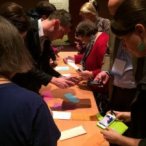
By Michael Griffin
What do Thomas Farrell, Barbara Sakamoto, Claire Kramsch, Chuck Sandy, Willy Renandya, and Jeremy Harmer have in common? Aside from being huge names in our field they are all people who were scheduled to give talks in South Korea in calendar year 2015. South Korea (hereafter Korea) is home to some big ELT conferences. I believe the KOTESOL International Conference is the biggest and best-attended of these. From my view, big conferences are just one of the reasons Korea can be a great place for professional development for English teachers. In this short “...
Speaking Tests: My Favorite and Not So Favorite Options

by Jackie Bolen
There are a few different options for speaking tests for your conversation classes, all of which have their advantages and disadvantages in terms of teacher effort, ease of grading and how well it measures what you’re trying to measure. I'll briefly outline the four major options:
A Speech
Some teachers put a big emphasis upon this, but a speech is not really a true test of conversational ability so if you teach a conversation class, it’s not ideal. Communication is more of a 2-way thing and is far better judged by the following speaking test...
The Responsibilties of Communication

by Justin Ancheta
Many years ago, I had the chance to attend a university-level summer engineering camp in high school. Towards the end, there was small-group activity centered around the Challenger Disaster of 1986. My group represented the engineers who were pleading with upper management to delay the launch of the space shuttle Challenger. The twist was that we couldn't use direct language in communicating our intent: words like “clear”, “failure”, “can't”, “must”, “crash”, “therefore”, and “have to” were replaced with words like “perhaps”, “likely”, and “maybe”. (The reason? A...
Stop Talking so Much!

by Jackie Bolen
When many teachers first start off their time in the classroom, they talk a lot (this is one feature of a teacher-centered classroom) and way more than they actually should. If you want your students to get better at speaking in English, they need to be speaking in English for most of the class, ideally at least 90% of it (this is one aspects of a student-centered classroom) if they are at intermediate to high levels of proficiency.
A Better Plan
The best way to make this happen is to put students in pairs or groups of 3, set up an activity or give them...
Blindness
by Justin Ancheta
Recently, one of my favorite paintings has been Pieter Breugel the Elder's “The Blind Leading The Blind”. While it's ostensibly an illustration of Matthew 15:14, it's taken on a variety of meanings to a variety of people. For me, it's an illustration of the many absurdities and perils of teaching English – how we can be blind to so many things, especially in how we lead others who may be just as blind as us.
Like scales falling from my eyes, the extent of my own blindness came to me a few weeks ago. I was going through my lesson PowerPoint files, revising...
Players In The Classroom
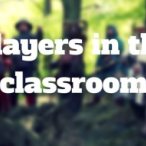
A post by Peadar Callaghan
A Multi-player online (MMO) game is very similar to a modern day classroom. They are both created environments with different ways to interact with material that is being supplied, either by the teacher (in the case of the classroom) or the server (in an MMO). They encourage both social interaction and individual work. The system is made up of many different individuals with different motivations goals and preferences for their style of interaction.
So what type of people would you expect to find in an online game?
In 1996 Richard Bartle put...
Adding Content to Language - Presenting Text!
A post by Rob Dickey
There's more to English than the nuts and bolts of the language. As with any language, it's meaningful only in context.
Unless you are dedicated to strict-translation or the grammar-translation or audio-lingual methods, you probably use content in your language lessons. Beyond the materials offered by the textbook, where can we go? Here I'll offer an amazingly useful topic area, and provide links to useful resources.
Topic: Business Communications: How to format your paper for "western" audiences.Far too often lower-skilled English language...
Back To School EdTech

Guest Post by Paul Lawley-Jones
For the majority of teachers in Korea it’s back to school on Monday 1st September.
Going through many teachers’ minds is “How can I engage my students? What new things can I do? What tools can I use to help me achieve that?”
In this article I’m going to give a brief overview of some tools I’ve used in the past, am going to use this semester, and some alternatives that I haven’t used that you may want to look at, too.
Student CommunicationGoogle Communities
This semester I’m going to require my students to set up Google...


